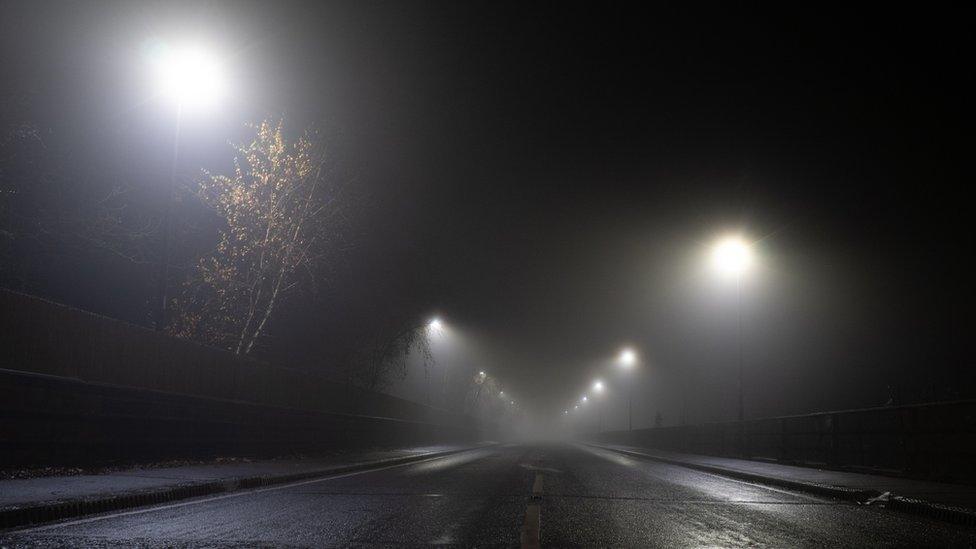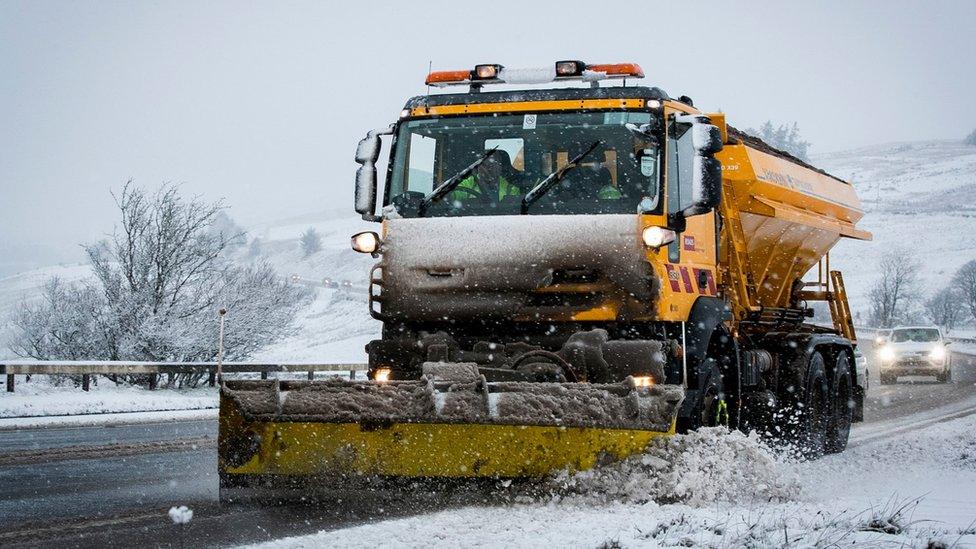NI budget: Infrastructure Department facing 14% spending cut
- Published
- comments

Increased energy prices have caused streetlighting costs to soar
The Department for Infrastructure (DfI) is facing stark budgetary challenges and a 14% cut in its day-to-day spending budget compared to last year.
A spokesperson said the 2023-24 allocation did not recognise the one-off decision last year to use Translink reserves to help maintain services.
It also did not reflect the additional funding needed for energy and inflation, they added.
Streetlights could be turned off and public transport reduced to save money.
The cost of streetlighting has more than quadrupled, due to increased energy prices.
DfI has already taken decisions to reduce expenditure and raise revenue, including increasing Translink fares, increasing on-street car park charges in Belfast, Lisburn and Newry and increasing non-domestic water and sewerage charges.
It has also made additional savings being delivered by Translink and Northern Ireland Water of £19m.
The other options available to the department to reduce the remaining resource deficit of over £100m involve scenarios include:
No road gritting service provided this winter
Water and wastewater treatment services reduced
Community transport losing funding
Road maintenance and flood management reduced to emergency-only services
DfI's capital allocation is £146m less than would have been required.
A spokesperson said it faced extremely difficult and unprecedented circumstances.

Meanwhile, the Department of Agriculture, Environment and Rural Affairs (Daera) said its allocation will mean a 1.5% cut to the day-to-day spending budget.
Its allocation of £579.8m includes £327.2m of ring-fenced funding for agriculture, agri-environment, and the wider rural economy and £3.1m for fisheries.
This funding was previously confirmed by the Treasury and was not subject to cuts.
The money cannot be used for other purposes.
Daera said there were significant financial pressures associated with the cost-of-living crisis, the rise in bovine TB and several other factors.
It said it was clear that delivering its statutory obligations, contractual commitments and its new statutory requirements, including those in the Climate Change Act, would be exceptionally challenging, with difficult decisions likely to be needed.
Waiting lists undermined?
Attempts to tackle Northern Ireland's waiting lists problem could also be undermined by budget pressures, the Department of Health warned.
Northern Ireland has the worst waiting list figures in the UK with about 378,000 patients waiting for a first consultant-led outpatient appointment.
The department said last week's budget leaves it about £470m short of estimated requirements for this financial year.
It warned cost saving measures under consideration included "reducing waiting list initiative activity".

The Department of Health says under the budget settlement it cannot resolve pay disputes.
The waiting list initiative has included creating additional in-house health service capacity over and above normal day-to-day work, as well as paying independent sector providers to assess and treat patients.
The department has told MLAs its budget is essentially flat in cash terms compared to last year but also faces additional financial pressures.
The biggest pressure is the cost of meeting health service pay claims, estimated to be £375m.
The department said under the budget settlement it will not be possible to resolve the current pay dispute.
High-impact cuts
Even if the settlement of pay disputes in England means additional funds for Stormont, the Secretary of State said that money must in the first instance be used to repay last year's £300m overspend.
If health service workers don't get any pay rise, that will still leave the budget short by the department's estimation.
It is warning of high-impact cuts as a result.
Aside from the potential cuts to waiting list work, other measures being considered are:
Reduction in nursing and residential care placements
Restriction of domiciliary care packages
Reduction in payments for support services provided by the voluntary sector
No final decisions have been taken on what measures to implement.
Related topics
- Published25 April 2023

- Published2 May 2023
